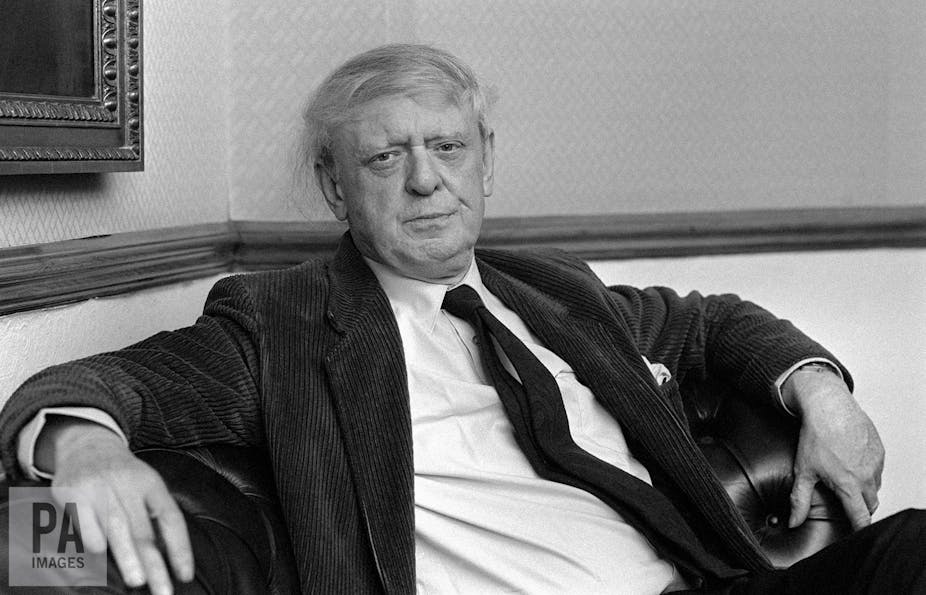Anthony Burgess, who would have celebrated his 100th birthday in 2017, is probably best known as the author of novels such as Earthly Powers, Nothing Like the Sun and A Clockwork Orange. Despite his worldwide reputation as the creator of nightmare futures, many people are unaware of Burgess’s credentials as an outspoken opponent of literary censorship.
From the beginning, his career as a novelist was plagued by legal difficulties. The second volume of his Malayan trilogy, The Enemy in the Blanket (published by William Heinemann in 1958), was the subject of a successful claim for libel in the High Court in Singapore. The judgement was overturned on appeal, but Burgess gained a reputation for being troublesome. Matters were not improved when another novel, The Worm and the Ring, was also judged to be libellous in 1962. Unsold copies of the book were pulped, and the novel has never been reprinted in its original form.

This was the context in which Burgess became a champion of free expression. When, in the early 1960s, his friend William Burroughs was having trouble finding a British publisher for his scandalous novel The Naked Lunch, Burgess wrote a letter to the Times Literary Supplement (published 2 January 1964) promoting Burroughs and his work, and another article published in the Manchester Guardian. Among the novel’s detractors was Dame Edith Sitwell, who wrote to the TLS, saying: “I do not wish to spend the rest of my life with my nose nailed to other people’s lavatories.”
In 1966 Burgess gave evidence on behalf of Hubert Selby, whose novel, Last Exit to Brooklyn, was the subject of an obscenity trial. When the novel was eventually acquitted in 1968, Burgess wrote an introduction to the first post-trial edition, in which he defended Selby’s writing on the grounds of literary merit. Reflecting on the Selby case in the 1990s, Burgess admitted that he had exaggerated the literary qualities of Last Exit to Brooklyn in order to thwart the guardians of public morals who had wanted to see it banned. He maintained that the deception had been worthwhile.
Harassed in Malta
Burgess embroiled himself in another controversy shortly after the Moors Murders trial, in which it was revealed that Ian Brady had owned a collection of books including erotic novels and a biography of the Marquis de Sade. Pamela Hansford Johnson wrote about the trial in a non-fiction book called On Iniquity: Some Personal Reflections Arising Out of the Moors Murder Trial (1967). Johnson quoted Burgess on free expression and attacked him as a “rhetorical poseur”.
Burgess’s response was swift and robust. In an article titled What Is Pornography? he wrote:
Any book can be used as a pornographic instrument, even a great work of literature, if the mind that so uses it is off balance. I once found a small boy masturbating in the presence of the Victorian steel-engravings in a family Bible […] Ban the Marquis de Sade and you will also have to ban the Bible.

Having established his anti-censorship credentials, Burgess moved to Malta with his wife and son in 1968. Shortly after arriving on the island, he discovered that a large chunk of his personal library had been impounded by the Office of State Censorship. The list of confiscated items included books by D.H Lawrence, Angela Carter and Kingsley Amis. When the Sunday Times sent a copy of Doris Lessing’s Children of Violence for review, this was also confiscated by the censors, presumably because of its inflammatory communist and feminist content.
Enraged by the climate of censorship in Malta, Burgess decided to open up the subject for debate. He gave a lecture at the University of Malta titled “Obscenity and the Arts”, in which he argued that the suppression of literature on ideological or religious grounds was intolerable in a modern liberal society. When Burgess left Malta to visit his wife’s family in Italy, he returned to find that his house had been confiscated by the vengeful Maltese government. He managed to get it back, but only after he had leaked the story to The Guardian and the New York Times.
Burning books
Living in Rome in the mid-1970s, Burgess decided to translate the obscene and blasphemous sonnets of the 19th-century Roman dialect poet Belli, who had worked as a Vatican censor by day and secretly written more than 3000 offensive poems, unpublished in his lifetime. Burgess translated Belli into defiantly colloquial English, taking care to preserve the tone of the original poems:
You know the day, the month, even the year.
While Mary ate her noonday plate of soup,
The Angel Gabriel, like a heaven-hurled loop,
Was bowing towards her through the atmosphere.
He crashed a window. Mary, without fear,
Saw him come through the hole in one swift swoop.
A lily in his fist, his wings adroop,
‘Ave,’ he said, and after that, ‘Maria.Rejoice, because the Lord’s eternal love
Has made you pregnant — not by orthodox
Methods, of course. The Pentecostal dove
Came silently and nested in your box.’
‘A hen?’ she blushed. ‘For I know nothing of –’
The angel nodded, knowing she meant cocks.
Later this year, the Manchester-based Pariah Press will reissue Obscenity and the Arts in a new edition, featuring responses to Burgess’s text by Germaine Greer and contemporary visual artists.

This publication promises to bring his various writings about censorship back into focus, and to animate new debates about a subject which has never gone away.
As we celebrate the 100th anniversary of Burgess’s birth, it’s worth asking what he would have thought of Charlie Hebdo, or modern-day erotica such as Fifty Shades of Grey. It’s more than likely that he would have quoted one of his favourite lines from the German poet Heinrich Heine, which Burgess himself translated thus: “Whoever burns books will be burning people next.”

